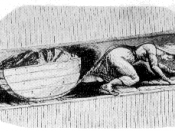Emancipation in the "long nineteenth century"ÃÂ The "long nineteenth century"ÃÂ as the period from 1750 to 1914 is commonly known is famous for the formation of many of today's political, social and cultural ideals. The French, American and Industrial Revolutions in this period could be considered to be the precursors upon which modern day society is based. The individual and family saw a massive change in their lives. The abolishment of serfdom in England, changes in property and working laws under Enlightened Despots such as Joseph II of Austria saw the proletariat gain liberties, although sometimes short-lived, that were inconceivable in the preceding generations. The long held theory of absolute monarchy, "L'etat c'est moi: I am the state"ÃÂ , began to be questioned. Although some would see this period of massive upheaval as a time in which the masses were liberated and indeed "emancipated"ÃÂ upon closer inspection this is not so clear.
Some theorists believe that the seeds of 19th Century socialism which were sown in the period were a direct precursor to Stalinist terror, a growth in slavery and a new wave of injustices, whilst others such as Marxists see a hope for a better world. Be it the terror of the French Revolution in the 18th century to the Stalinist purges and Hitler lead genocide's of the 20th century, the outcomes of many emancipatory ideals was seen to have massive negative implications on society. "The scientific community ceased to exist during the terror"ÃÂ. In this light we must ask ourselves whether indeed the long nineteenth century could be summed up as a period of liberation or whether it would be better viewed as the starting place for modern day capitalism. A new form of global dictatorship in which a small bourgeois class now controls power, well beyond the...


